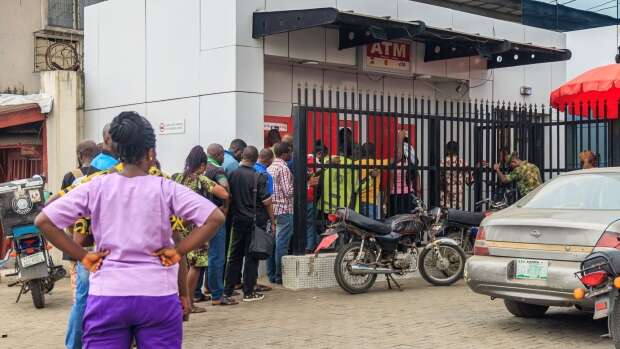Lack of cash is stalling Nigeria’s $220bn informal economy
For 20 years, Ogbogo Moses used cash to trade fresh fruits for six days a week in Nigeria’s northwestern Kaduna state. Now she’s lucky to get clients every other day and is stocking up only half her usual quantity.
Moses’ business is among the collateral damage of the Central Bank of Nigeria’s move to demonetize high-value notes to mop up excess cash, rein in inflation and even stymie abductions.
So far the hardest-hit are individuals, small businesses, transport firms and cocoa farmers who depend on Nigeria’s informal economy, which the International Monetary Fund estimates accounts for more than half of the nation’s gross domestic product. That’s about $220 billion — more than Ukraine’s GDP.
Across Africa’s most-populous nation, residents are thronging bank branches, ATMs and central bank offices in a vain attempt to get hold of the new notes. Violent protests have prompted bank employees to flee branches in many states, further worsening the shortage. Similar scenes played out in India six years ago after the Asian nation banned high-value notes without ensuring banks had enough supplies of new currency. That should have provided a cautionary tale for Nigeria.
“It’s gotten worse,” Moses, 47, said by phone. “I couldn’t earn a kobo because I went to the central bank, yet I came back with the old notes, which nobody will accept from me anymore,” she said, referring to Nigeria’s smallest monetary unit.
The central bank has said that the move to redesign notes will lower the amount of cash in circulation and improve the efficacy of monetary policy.
Governor Godwin Emefiele also said that reducing the volume of money outside the banking system will help cut the source of funds used for ransom payments in a country where there are frequent kidnappings. About 2.1 trillion naira ($4.6 billion) of cash has already returned to banks.
The central bank announced the plan to redesign 200-, 500- and 1,000 naira notes in October, but the cash shortage became pronounced in the past few weeks. Earlier this month, as many as 10 states asked the Supreme Court to stop the plan, prompting President Muhammadu Buhari to allow the 200-naira notes back into circulation.
That didn’t help ease the crisis, which has divided the ruling All Progressives Congress days before voters head to the polls to elect a new president. The controversy has pitted the incumbent against Bola Tinubu, the presidential candidate from Buhari’s party, who backs keeping old notes in circulation longer
A Supreme Court injunction on Feb. 8 blocked the central bank from enforcing its policy until it rules on the governors’ lawsuit. The case is scheduled to resume on Wednesday.
The scramble for cash from Kaduna — home to Peugeot SA’s Nigerian assembly plant — to shops in Lagos, Africa’s most-populated city, is likely to play a key role as citizens vote to elect a new president on Saturday.
“It will impact the economy negatively, especially the huge informal sector,” said Mosope Arubayi, an economist at IC Group. “It used to be dollar crisis, now it’s like we have naira crisis.”
Nigeria, which has suffered two recessions in the past seven years, is still struggling to recover from the Covid-19 pandemic. Even before the central bank’s move, growth in the $440-billion economy was expected to slow to 2.9% this year. In the final quarter of 2016 following the cash ban, India’s economy grew at the slowest pace since 2014.
The latest fiasco may stymie Nigeria’s growth further. That’s because only 60% of Nigerian households have access to bank accounts, relying mainly on cash for every economic activity. And it’s not just individuals.
Take the cocoa industry for example. From paying farmers for harvesting the beans, sun-drying the crop, selling to exporters, finally transporting the commodity — including buying diesel for trucks — everything is paid for in cash. Even the government collects its levy in currency.
“We have no cash to pay our members for their cocoa supplies and they won’t accept bank transfers,” said Isaac Arayela, a manager at the Ile-Ife Cooperative Produce Marketing Union, a cocoa farmers organization in Osun state. The cooperative had about 500 tons of cocoa in its stores last week, but no cash to pay its suppliers, he said.
The central bank’s decision has forced many families to spend hours trying to exchange notes, costing them at least a day’s worth of business.
Some residents who couldn’t afford to spend seven hours in queues at ATMs were paying as much as 30% commission to point-of-sale vendors to get hold of cash.
“Since the past weeks, what I sell isn’t enough to take care of my kids,” said Moses, a mother of five children.
The Arena Market, a sprawling outdoor complex of shops on the Lagos mainland, is usually crowded with shoppers. But on a recent Saturday, there were hardly any customers. Christella International, a shoe importer that sold 150 pairs a day in November, has seen sales plummet almost 90% since January, according to its owner, Chris Anyigor.
“You can see it with your own eyes, nobody is coming,” Anyigor said, as he wiped the dust accumulating on shoes. “Between the government and the banks, they should find a solution before people will start dying of hunger.”








